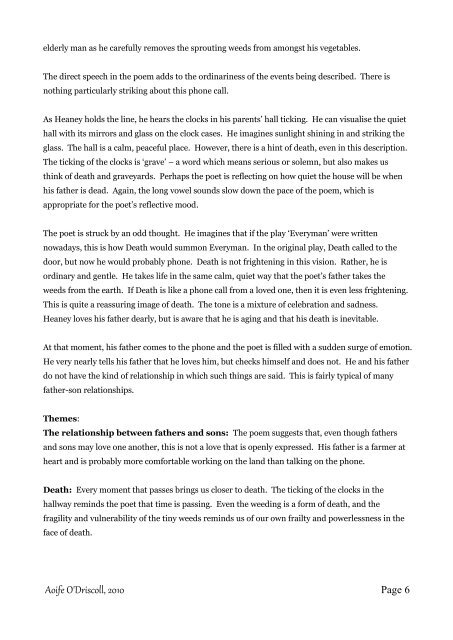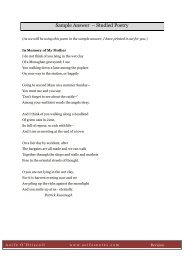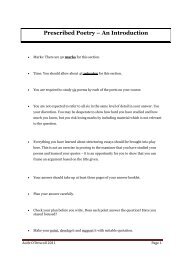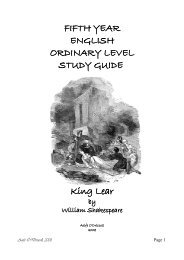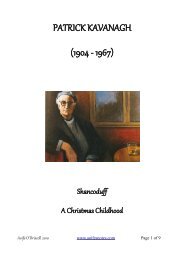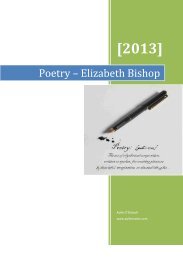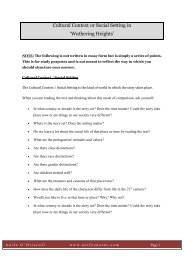Heaney .pdf - Aoife's Notes
Heaney .pdf - Aoife's Notes
Heaney .pdf - Aoife's Notes
You also want an ePaper? Increase the reach of your titles
YUMPU automatically turns print PDFs into web optimized ePapers that Google loves.
elderly man as he carefully removes the sprouting weeds from amongst his vegetables.<br />
The direct speech in the poem adds to the ordinariness of the events being described. There is<br />
nothing particularly striking about this phone call.<br />
As <strong>Heaney</strong> holds the line, he hears the clocks in his parents’ hall ticking. He can visualise the quiet<br />
hall with its mirrors and glass on the clock cases. He imagines sunlight shining in and striking the<br />
glass. The hall is a calm, peaceful place. However, there is a hint of death, even in this description.<br />
The ticking of the clocks is ‘grave’ – a word which means serious or solemn, but also makes us<br />
think of death and graveyards. Perhaps the poet is reflecting on how quiet the house will be when<br />
his father is dead. Again, the long vowel sounds slow down the pace of the poem, which is<br />
appropriate for the poet’s reflective mood.<br />
The poet is struck by an odd thought. He imagines that if the play ‘Everyman’ were written<br />
nowadays, this is how Death would summon Everyman. In the original play, Death called to the<br />
door, but now he would probably phone. Death is not frightening in this vision. Rather, he is<br />
ordinary and gentle. He takes life in the same calm, quiet way that the poet’s father takes the<br />
weeds from the earth. If Death is like a phone call from a loved one, then it is even less frightening.<br />
This is quite a reassuring image of death. The tone is a mixture of celebration and sadness.<br />
<strong>Heaney</strong> loves his father dearly, but is aware that he is aging and that his death is inevitable.<br />
At that moment, his father comes to the phone and the poet is filled with a sudden surge of emotion.<br />
He very nearly tells his father that he loves him, but checks himself and does not. He and his father<br />
do not have the kind of relationship in which such things are said. This is fairly typical of many<br />
father-son relationships.<br />
Themes:<br />
The relationship between fathers and sons: The poem suggests that, even though fathers<br />
and sons may love one another, this is not a love that is openly expressed. His father is a farmer at<br />
heart and is probably more comfortable working on the land than talking on the phone.<br />
Death: Every moment that passes brings us closer to death. The ticking of the clocks in the<br />
hallway reminds the poet that time is passing. Even the weeding is a form of death, and the<br />
fragility and vulnerability of the tiny weeds reminds us of our own frailty and powerlessness in the<br />
face of death.<br />
Aoife O'Driscoll, 2010 Page 6


